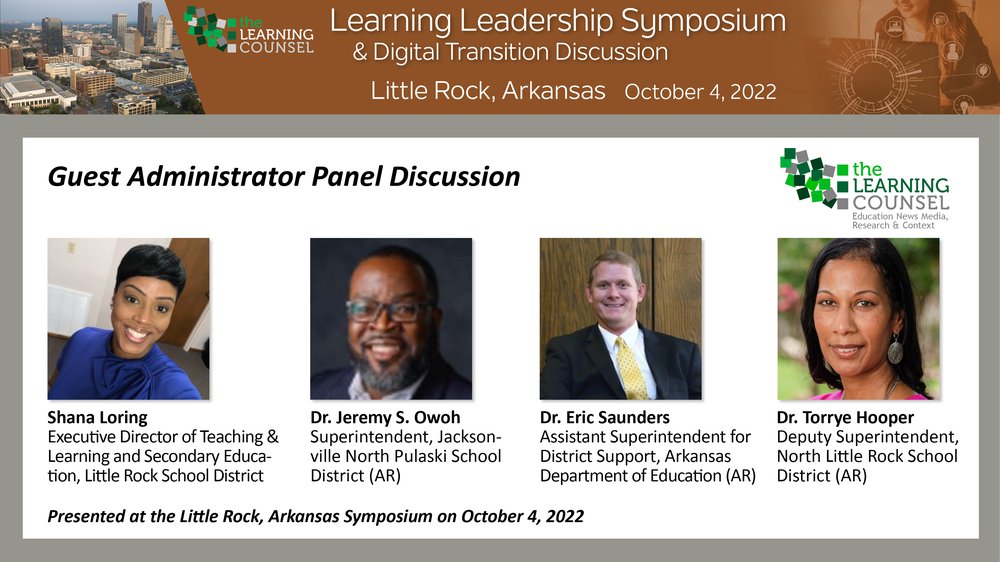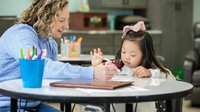If you are familiar with the Learning Counsel’s Learning Leadership Symposia, you may know that the high point of the day is generally the Administrative Panel Discussion, a high-stakes, high-yield discussion from the finest education minds in the region. And as is usually the case, these panel discussions are no-holds-barred, with everything on the table and fair game. In this Little Rock area Panel Discussion, the participants included Shana Loring, Executive Director of Teaching and Learning and Secondary Education at Little Rock School District, Dr. Jeremy S. Owoh, Superintendent at Jacksonville North Pulaski School District, Dr. Eric Saunders, Assistant Superintendent for District Support, Arkansas Department of Education, and Dr. Torrye Hooper, Deputy Superintendent at the North Little Rock School District.
According to Dr. Jeremy S. Owoh, Superintendent at Jacksonville North Pulaski School District, “It’s important that we look at the individual student, and his or her needs. I think you need multiple options and opportunities for learning in a school setting. One thing that the pandemic did show is that we need other learning experiences. We need learning options, because all our students learn differently. One of the things that I've noticed as the superintendent of Jacksonville, is that we have students who flourished in a virtual learning environment and some who did not. We have students who flourish in a smaller learning environment and some who are very social, and they feed off people and the collaboration. One of the things that we definitely need to do is make sure that we have those multiple learning opportunities for all of our scholars, and then give them options, which causes us to be quiet and listen to our students.”
“A lot of times the adults are quick to tell the students what they need and how they should learn,” continued Owoh. “But in this day and time, we need to do less talking and more listening to our young people so that we can develop the right learning experience for them because they're learning completely different than the way we learned. Because of the pandemic, we found out how we are providing the instruction is not the best way. What we consider technology, the technology that we used in the classroom, wasn't truly technology. We just need to make sure we provide those opportunities. And the first thing is to build those relationships, which means you have to get to know the people that you're supporting. The people that you're serving.”
“I wanted to piggy piggyback off of what Dr. Owoh just said, and education is not my first profession,” said Shana Loring, the Executive Director of Teaching and Learning and Secondary Education at Little Rock School District. “It's actually my second. One of the things that I learned from being in business is that you have to continue to grow and innovate and change with the needs of your customers. And that's one shift that we really need to see in education, because historically, we've had this pool of customers and no matter what we did, the law required students to come to school. One of the things that we've learned through the pandemic is that they have other choices now, and they're making other choices. And as a result, we're seeing declining enrollment in our schools. We're seeing students opt for homeschool for other educational options. So how do we compete with these other opportunities and offerings that students have? How do we enhance and change and innovate our product that we're providing for students to make it more attractive for today's students? What is it that they're looking for? How do we tailor what we're offering to the needs of our students? What are our students saying they need or want to see in terms of classroom instruction, and how can we provide that?”
Dr. Eric Saunders, Assistant Superintendent for District Support for the Arkansas Department of Education said, “From the fiscal perspective, I think we're in a great opportunity. But I also think it's going to be very difficult though. We are looking at ESSER funds. And ESSER funds are big money. BIG
MONEY. We've never had that much money. And you had ARP funds the last part of that, of which 20 percent was set aside for learning loss. You know, a lot of districts have frankly told me they've had difficulty getting creative enough to find ways to spend all that money. But one thing that we have to be very responsible about is basically each district needs to have an ESSER exit strategy.
“We need to think, we've put in before and after school programs. We've put in tutoring. We've put in summer schools. We've bought this software and that software, we've done all these things with ESSER funds. In some districts they have, they'll be done at the end of this year or at the end of this fiscal year. And so my question then to them is, which of those practices are you going to cut? Will you cut all of them that you've been paying with funds or will you going to continue? We're at a great opportunity, yet we have to be responsible enough to look at each one of those practices and truly determine how effective was this? How effective was that? We need to look at what's most effective and what's helping the kids.”
LeiLani Cauthen, Panel Moderator and CEO of the Learning Counsel News Media and Research commented, “I would contend that most of the practices have ultimately not been effective. Because what has been happening is in an age of structural shift where people want something else, they can't define it without rethinking structure. They are thinking in a dichotomous way, either online or in the building. They are not thinking down the middle. The programs and practices are all good, but they're programmatic, they are not structural.”
“During the pandemic, I shifted from being a principal to central office, said Loring. “And as a principal, I spent that year responding. How do I shift when I don't have teachers? How do I shift when half of my devices come back broken? How do I shift to programs that are going to be of best use to my students? How do I shift and make sure students have access to technology in their homes when they can't come to school? So instead of being able to forward plan, in many, many cases, we have been responding to one disaster, one emergency, one crisis after another.
“I feel like most districts, we're now getting to a point now where we can start moving forward with the planning pieces. How do you prepare teachers? Because even if we have all this money to put the appropriate things in place, do we have mind shift?
Dr. Torrye Hooper, Deputy Superintendent at North Little Rock School District added, “Our superintendent Dr. Pilewski and our school board were very bold. Within these past six months and a month of February-ish, we did a reorg based on the needs and the data trends of our district. So, with that, we are currently having those courageous conversations, not just with principles, but with our executive team as well, to sustain what we're going through. Is it uncomfortable? Of course, it is. Is it shifting their learning? Definitely. However, that is based on the needs of our customers, as you would say (nod to Shana Long). We realize that our parents and our students are our customers. So, we are also looking at our marketing strategy. We have had an influx of students based on the innovative and bold initiatives that we're implementing to try to recuperate our students and to try to keep the ball moving. Because at the end of the day, we are in the business of servicing students.”
This is only a portion of the hard-hitting Administrator Panel Discussion video. You’ll want to see every minute, as these administrators explain the challenges they have overcome, and explain how you can overcome those challenges in your district as well.











